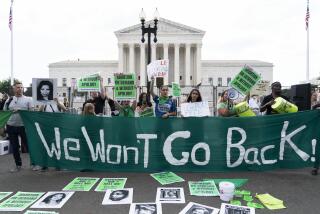Judicial activism awards fixed!
As Smith Barney might put it, the epithet of “liberal judicial activism” has acquired its stigma the old-fashioned way: It’s earned it.
For several decades now, the courts have overridden the efforts of American citizens to enact policies through their local, state and national legislators on a broad range of matters that the Constitution leaves, wholly or largely, to the democratic processes. The courts have instead entrenched the left’s agenda on such issues as abortion, the death penalty, pornography, marriage, criminal rights and radical secularism. This spate of liberal judicial activism has, in turn, triggered a broad reaction in favor of principles of judicial restraint, a reaction that is both legally sound and politically potent.
A cottage industry of liberal academics and commentators has arisen to try to defuse the charge of liberal judicial activism. But the arguments cobbled together by this cottage industry are shoddy. Consider the deep defects in the recent Op-Ed by Thomas J. Miles and Cass R. Sunstein, “Who are the bench’s judicial activists?”
Miles and Sunstein breezily assert that run-of-the-mill cases reviewing the actions of federal administrative agencies, rather than “high-profile constitutional rulings,” provide the best measure of which Supreme Court justices are most activist. That assertion is badly flawed.
First, unlike a Supreme Court ruling that finds a federal or state law unconstitutional, a ruling that invalidates federal agency action as contrary to statute does not end the political processes. On the contrary, Congress is free to revise statutory law to permit or even require the same agency action. Further, in the frequent instances in which the agency has merely failed to follow proper procedures, the agency itself is free to redo its work and achieve the same result.
Second, federal bureaucrats are themselves insulated from, and not directly accountable to, American citizens. They are not, and are not intended to be, representatives of the American people, as legislators are. Thus, a court’s mistaken overturning of bureaucratic action does not present the direct clash with principles of representative government that judicial activist rulings on constitutional issues produce.
Even on their own narrow administrative turf, Miles’ and Sunstein use a defective approach. They classify rulings as “restrained” or “activist” without regard to any qualitatitive assessment of whether the ruling is correct. They implicitly presume that the work product of federal bureaucrats is politically neutral. Only ivory-tower academics unfamiliar with, or blissfully inattentive to, the ways of Washington would make this presumption. If an agency shows a bias in a particular direction, a neutral judge’s decisions overruling that agency’s actions would of course show a pattern in the opposite direction. Thus, if federal agencies, captured by career bureaucrats, are prone to err in a liberal direction, the “Partisan Voting Award” that Miles and Sunstein would confer on Justice Thomas instead belongs to the agencies.
Miles’ and Sunstein’s statistics are also skewed by the fact that they cover the period from 1989 through 2005. Justices Ginsburg and Breyer were not on the court in the early years of that period, when the court was reviewing agency decisions from Republican administrations that account for about a third of the total cases. The relative partisanship that Miles and Sunstein find in Ginsburg’s and Breyer’s votes would surely have been much higher if Miles and Sunstein had used the same set of cases for all justices.
There should be no mystery to who the real judicial activists on the court are. Through their extravagant and unconstrained conceptions of the judicial role and their demonstrated eagerness to impose their own policy preferences on the American people, the real judicial activists are justices Stevens, Souter, Ginsburg, Breyer, and only to a somewhat lesser extent Kennedy. Don’t let Miles and Sunstein distract you from this reality.
Edward Whelan is president of the Ethics and Public Policy Center, a think tank based in Washington, D.C. He is a regular contributor to National Review Online’s Bench Memos blog on constitutional issues.
More to Read
A cure for the common opinion
Get thought-provoking perspectives with our weekly newsletter.
You may occasionally receive promotional content from the Los Angeles Times.






